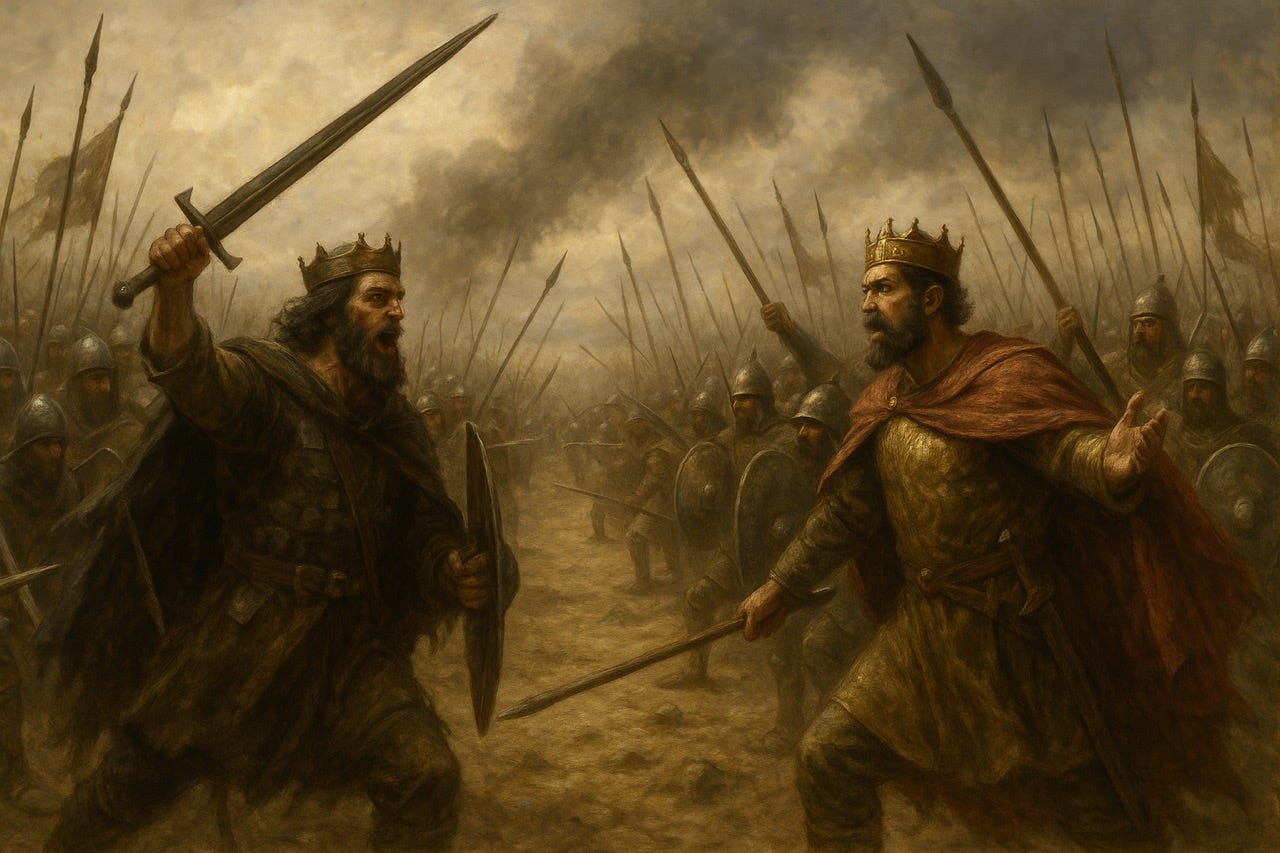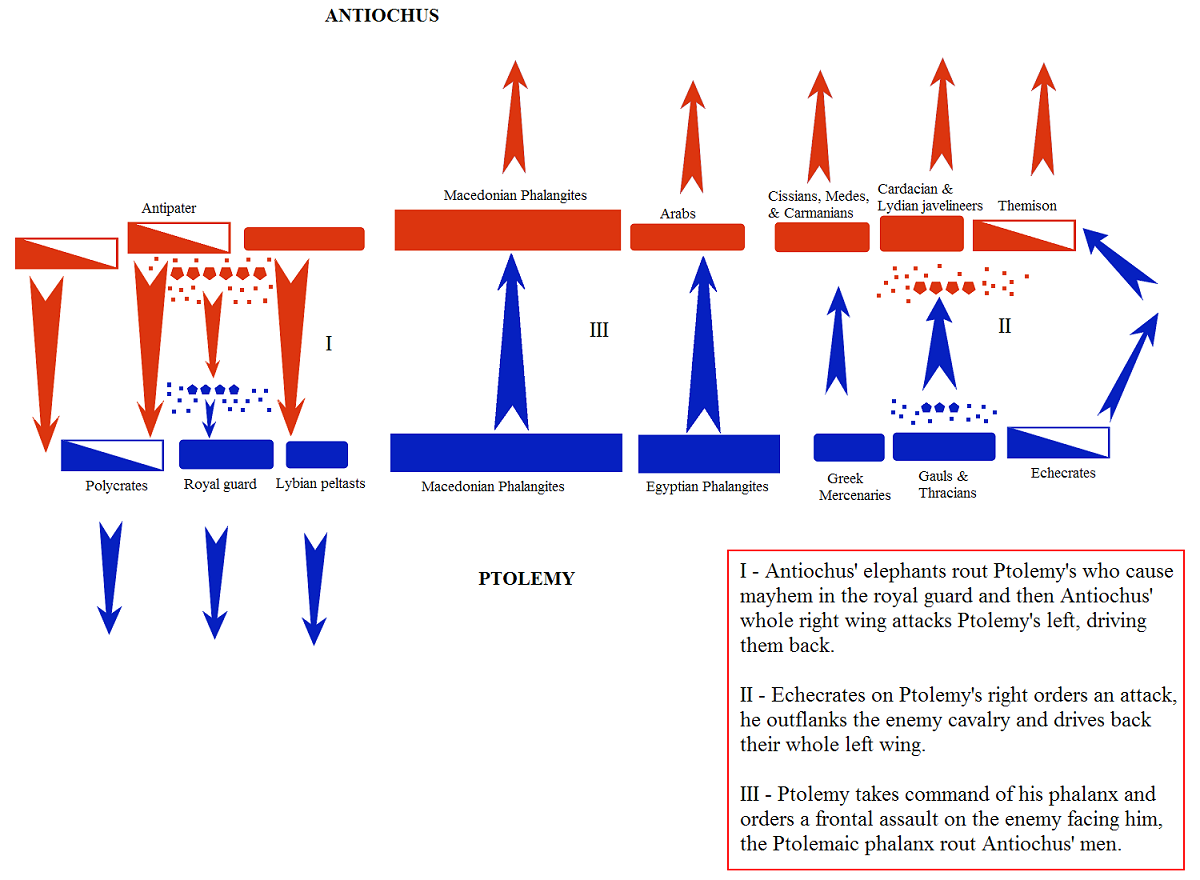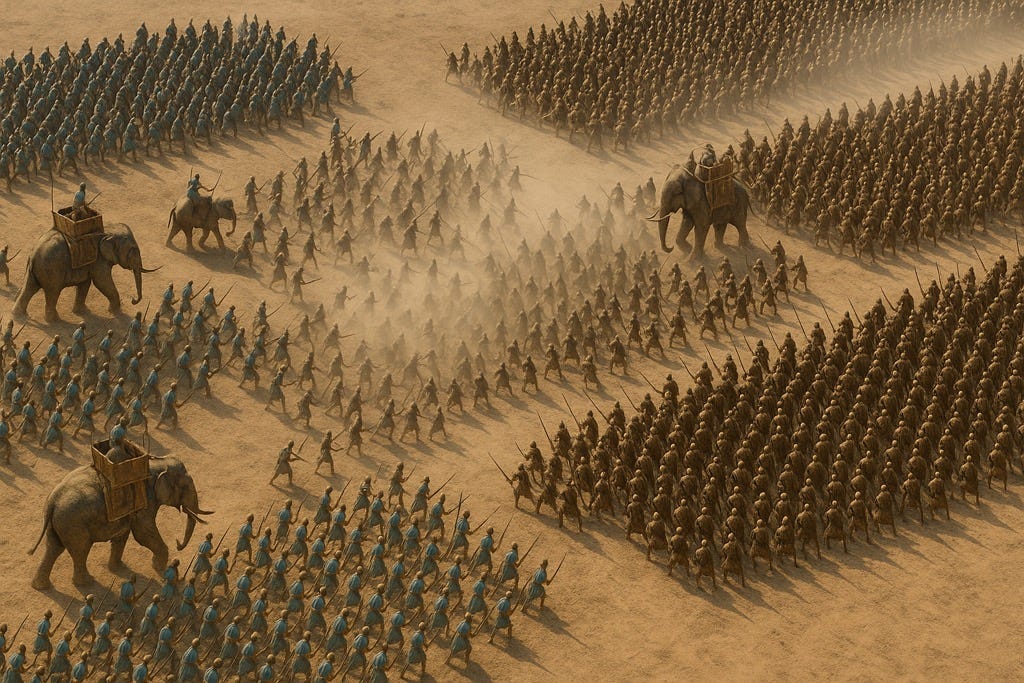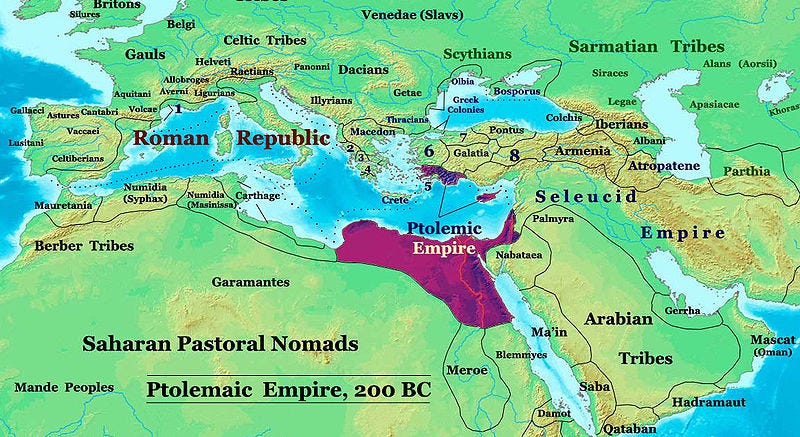Diving into Daniel: The Kings Battle Again and Again
Daniel 11:10-13 - There are at least three things assured in this mortal, fallen life: Death, taxes and war!
““His sons will mobilize and assemble a multitude of great forces; and one of them will keep on coming and overflow and pass through, that he may again wage war up to his very fortress. The king of the South will be enraged and go forth and fight with the king of the North. Then the latter will raise a great multitude, but that multitude will be given into the hand of the former. When the multitude is carried away, his heart will be lifted up, and he will cause tens of thousands to fall; yet he will not prevail. For the king of the North will again raise a greater multitude than the former, and after an interval of some years he will press on with a great army and much equipment.”
Daniel 11:10-13 NASB1995
It’s like a broken record during this time in history. The sons of the King of the North mobilize and assemble a multitude of great forces. These events occur in about 223 B.C.; the rise of Antiochus III the Great is foretold now in the prophecy. Here is what Precept Austin says about the first verse of this passage in the larger picture of events:
In Daniel 11:10-19 God prophesies events that indicate Syria will gain ascendancy over Egypt and in so doing would gain control of the Holy Land, which in turn sets the stage for the persecutions in Israel brought about by the despicable Syrian king Antiochus Epiphanes (Da 11:21-35).
His sons - The sons (successors) of Seleucus II Callinicus continued the great conflict against Egypt, as summarized in Daniel 11:11-19 and then in great detail in Da 11:20-35. The sons included Seleucus III Ceraunus (Thunder) (aka - Seleucus III Soter = "Savior") who reigned from 225BC until his assassination in 223BC and his brother Antiochus III, who would soon become known as Antiochus III the Great. Seleucus III and Antiochus III of the North waged continual war against the King of the South Ptolemy Philopator.
One of them will keep on coming and overflow - Note the detail of the prediction. The plural sons becomes the singular one, for after the assassination of the first son, the focus immediately shifts to Antiochus III the Great (223-187BC) who succeeded his brother.
Pass through - Antiochus III the Great passed through the beautiful land of Israel to attack Egypt which was then under the reign of Ptolemy IV Philopator (221-204BC). Though Antiochus III did not defeat Egypt, he was successful in gaining control of Israel during his campaign of 219-217BC.
Up to his very fortress - Antiochus campaigned in Phoenicia and Palestine, as far south as the fortress at Gaza, his (Ptolemy IV Philopator's) very fortress but as predicted (and as became true) below the Egyptian king was enraged at the intrusion of his archrival into his empire and this precipitated the famous Battle of Raphia (aka, Battle of Gaza) in 217BC.
The fulfillment of all of these predictions not only prove that God is able to anticipate history by hundreds of years, but that He is also able to set the stage for events in the Holy Land, which was the primary concern of this revelation to Daniel.
The King of the South (Ptolemy IV Philopator) is enraged at the intrusion of Antiochus III the Great into his empire. In 217 B.C., he launches a counterattack, the Fourth Syrian War Battle of Raphia (see link in the excerpt above from Precept Austin). Here is a layout of the battle from Wikipedia:
Created for Wikipedia by Javierfv1212, with no copyright protection or license.
A fascinating aspect to this battle was the fact that there were troops mounted on elephants on both sides!! The troops of Antiochus III the Great were using elephants from Asia, while the Ptolemaic troops apparently used much smaller (and now extinct) elephants from Northern Africa or African forest regions that were easily spooked. In spite of the greater advantage for the troops from the North, the South prevailed. Steve created another AI version of the battle, which I think is quite good:
This image was created using DALL·E, OpenAI’s legacy image generation model.
Here’s more from Precept Austin:
The king of the South - Ptolemy IV Philopator (221-204BC) launched a counterattack against Antiochus III.
Will be enraged and go forth and fight against the king of the north - In an attempt to recapture his lost territory to the north, Ptolemy IV Philopator attacked Antiochus III the Great on the southern borders of Israel, at Battle of Raphia which was "also known as the Battle of Gaza, was a battle fought on 22 June 217 BC near modern Rafah (see map) between the forces of Ptolemy IV Philopator, king of Egypt and Antiochus III the Great of the Seleucid kingdom during the Syrian Wars. It consists one of the largest battles of the Hellenistic kingdoms of the Diadochi and was waged to determine the sovereignty of Coele Syria." (Reference)
The historian Polybius, records an interesting "anecdotal" fact regarding this battle "Ptolemy's elephants were of the African Forest Elephants; those of Antiochus were mainly of the large Syrian Elephants, brought from India. According to Polybius, the African elephants could not bear the smell, sound and view of their Indian counterparts and would easily give way and rout. (Reference)
The latter will raise a great multitude - Referring to the large Syrian army (62,000 infantry, 6,000 cavalry, 103 elephants) raised by Antiochus III the Great .
That multitude will be given - This phrase ("be given") reminds us that even the results of these great conflicts are in the hands of El Elyon: Most High God, Who is Sovereign Over Allfor...
Into the hand of the former - The hand is often (as in this verse) used in the Old Testament as a symbol of power (cf, Dt 4:34, 5:15, 7:8, 15, 11:2) so to be given into the hand of someone meant to be given over into their power. At the Battle of Raphia in 217BC, Ptolemy IV Philopator defeated Antiochus III the Great who lost virtually his entire army. Egypt regained control of Palestine but this control would be relatively brief as described in Da 11:12ff.
Jerome records that"Antiochus lost his entire army and was almost captured as he fled to the desert."
This map, found on Precept Austin, shows the extent of the Ptolemaic empire after this battle (source unknown):
Ptolemy IV Philopator was victorious, at least for now!! Naturally, this leads to him having great personal pride in his military accomplishments (his heart was lifted up). And we know what happens when pride takes hold in a human heart. Here is more from Precept Austin:
NLT - After the enemy army (of Antiochus III the Great) is swept away, the king of the south will be filled with pride and will have many thousands of his enemies killed. But his success will be short lived.
His heart will be lifted up - Describing the pride of Ptolemy IV Philopator which is an ever present danger for men who achieve success for such an attitude calls forth the opposition of God...
GOD IS OPPOSED TO THE PROUD, BUT GIVES GRACE TO THE HUMBLE. (Jas 4:6-note, 1Pe 5:5-note, quoting the Septuagint of Pr 3:34)
He will not prevail (literally "become strong") - Ptolemy IV Philopator was proud and thus did not pursue his military advantage, even though he had caused tens of thousands of Syrian soldiers to fall. He did however acquire all of Palestine and there was a period of "relative peace" in Palestine and peace between Syria and Egypt for about 14 years (see Da 11:13).
So our passage ends about 15 years after this victory by the Ptolemaic Empire, when Antiochus III The Great regroups after garnering more conquered lands to the north and east and returns with a much larger army to defeat the South and regain the lands in Palestine. From Precept Austin:
After an interval of some years - In about 201BC, some 15+ years after having been defeated by Egypt (Da 11:11), Antiochus III returned to Palestine with a much larger army and was able to repulse the Egyptians who were now under the rule of the child king (age 4-6 yrs), Ptolemy V Epiphanes (203-181BC). Thus Antiochus brought the Beautiful Land under his control as far south as the fortress of Gaza.
Apparently, Ptolemy IV Philopator and his wife died under mysterious circumstances around 203 B.C.; their son is the king, but he is a small child.
My next devotional examines Daniel 11:14-16 - Many will rise up against the King of the South and support Antiochus III.
Heaven on Wheels Daily Prayer:
Dear Lord - Help me to learn the lesson of pride when an accomplishment is achieved, as being prideful can lead to inertia when faced with new tasks. Amen.
Scripture quotations taken from the (NASB®) New American Standard Bible®, Copyright © 1960, 1971, 1977, 1995 by The Lockman Foundation. Used by permission. All rights reserved. lockman.org
Precept Austin was accessed on 5/26/2025 to review commentary for Daniel 11:10-13.






